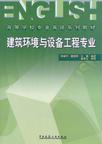建筑环境与设备工程专业
2005-1
中国建工
张寅平 等著
274
435000
无
张寅平和潘毅群等编著的《建筑环境与设备工程专业》材料选自美国暖通空调制冷机械工程师协会1999-2003年的4卷手册(ASHRAE
Handbooks)。该手册每年1卷,4年一轮回,内容包括暖通空调制冷领域的基础理论、设备知识和应用情况,内容系统、语言规范,是暖通空调制冷领域难得的专业英语阅读材料库。结合多年的教学实践,编者在选材上作了精当的取舍。《建筑环境与设备工程专业》共分四部分:第一部分(第1课-第5课)为基础理论,内容为热力学和制冷循环、流体流动、传热、传质和湿度;第二部分(第6课-第8课)为一般工程信息,内容为热舒适、空气污染物和室内环境健康;第三部分(第9课-第14课)为暖通空调系统和设备,内容为暖通空调系统分析和选择、集中式制冷和采暖、分散式制冷和采暖、空气冷却和除湿盘管、颗粒污染物的空气净化器、整体式空调器和热泵;第四部分为科技论文写作。附录含习题答案、生词总表、建筑环境与设备工程专业国际学术期刊简介、国际学术期刊论文检索简介及相关国际学术组织和网站简介。《建筑环境与设备工程专业》可作为建筑环境与设备工程专业、工程热物理专业及相关专业本科生专业英语课程用教材,也可供上述专业的教师、科研人员参考使用。
Part Ⅰ Theory
LESSON 1 THERMODYNAMICS AND REFRIGERATION CYCLES
LESSON 2 FLUIDFLOW
LESSON 3 HEAT TRANSFER
LESSON 4 MASS TRANSFER
LESSON 5 PSYCHROMETRICS
Part Ⅱ General Engineering Information
LESSON 6 THERMAL COMFOR
LESSON 7 AIR CONTAMINANTS
Part Ⅲ HVAC systems and equipment
LESSON 8 CENTRAL COOLING AND HEATING
LESSON 9 DECENTRALIAED COOLING AND HEATING
LESSON 10 AIR-COOLING AND DEHUMIDIFYING COLLS
LESSON 11 AIR CLEANERS FOR PARTICULATE CONTAMINANTS
LESSON 12 UNITARY AIR CONDITIONERS AND UNITARY HEAT PUMPS
英文科研论文写作简介
练习参考答案
附录A 国际相关组织介绍
附录B 有关国际会议简介
附录C 相关领域的一些国际期刊简介
附录D EI和SCI检索的简易教程
This definition leaves open what is meant bycondition of mind or satisfaction, but it correctly emphasizes that the judgment of comfortis a cognitive process involving many inputs influenced by physical, physiological, psy-chological, and other processes. The conscious mind appears to reach conclusions about thermal comfort and discom-fort from direct temperature and moisture sensations from the skin, deep body tempera-tures, and the efforts necessary to regulate body temperatures (Hensel 1973, 1981; Har-dy et al. 1971; Gagge 1937~ Berglund 1995). In general, comfort occurs when bodytemperatures are held within narrow ranges, skin moisture is low, and the physiologicaleffort of regulation is minimized. Comfort also depends on behavioral actions that are initiated unconsciously or by theconscious mind and guided by thermal and moisture sensations to reduce discomfort. Someof the possible behavioral actions to reduce discomfort are altering clothing, altering activ-ity, changing posture or location, changing the thermostat setting, opening a window,complaining, or leaving the space. ……

无
值得一看,有助于加深对专业的理解
挺好的啊挺好的啊挺好的啊挺好的啊